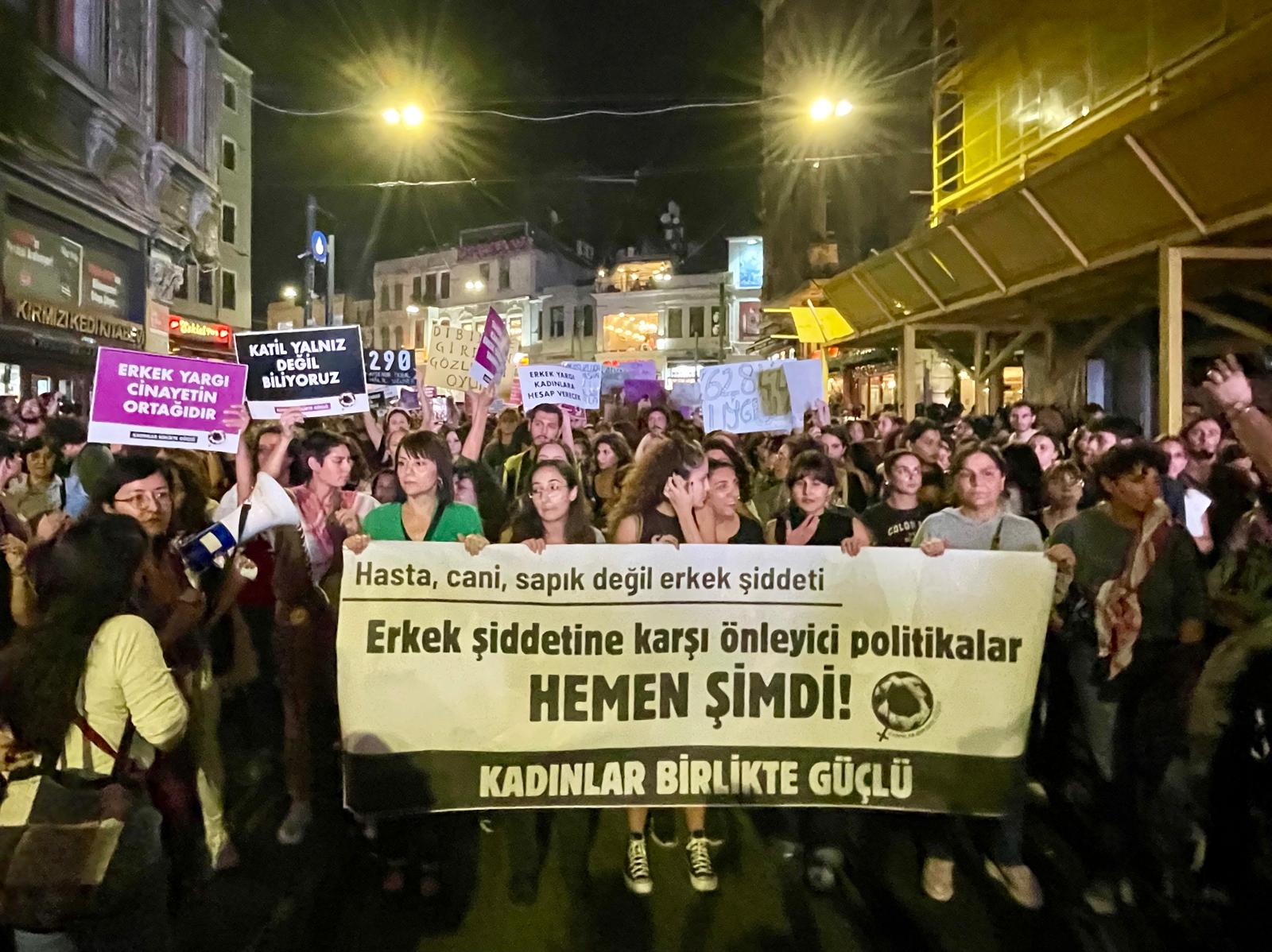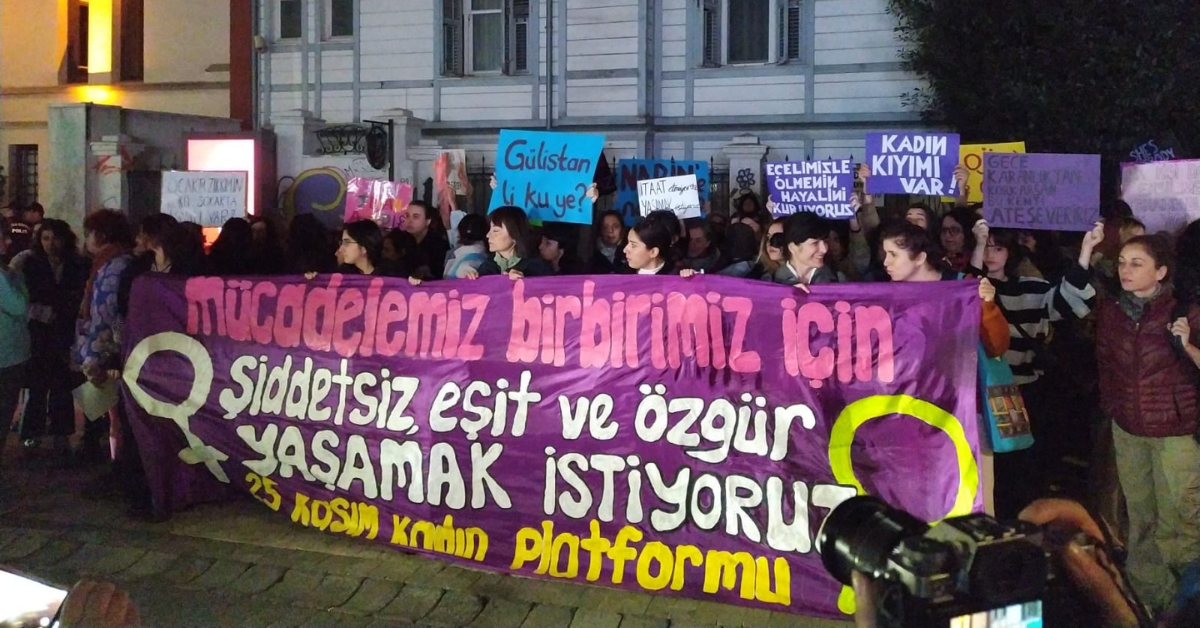About
This article examines the recent surge in public outrage against femicides in Türkiye. Despite increased recognition of gender inequality as the root issue, state efforts to protect women remain inadequate, and many cases continue without justice. As the article explains, Türkiye’s feminists have fought tirelessly to reframe femicides as acts of systemic male violence rather than isolated incidents, challenging prevailing narratives that obscure this reality. In the face of political setbacks, like Türkiye’s withdrawal from the Istanbul Convention, feminsists are pushing for a full recognition of femicide as a social and political crisis—one demanding accountability, comprehensive prevention, and justice.
Written by
Selime Büyükgöze, Leyla Soydinç and Elif Ege, Mor Çatı Women’s Shelter Foundation1
Femicides in Türkiye: The Feminist Struggle Against Systemic Male Violence
In recent days, there has been public outrage in Türkiye over femicides. This was triggered by consecutive femicides making headlines and the media’s coverage of violence against women. In 2023, at least 333 women were killed in Türkiye.2 In addition to that, there were also several suspicious deaths and suicide incidents of women. This figure is an estimate, as the exact number is unknown due to the lack of publicly available data on femicides. The cases we know about are limited to those covered by the media, and only certain incidents receive public attention.

Although the growing public outcry is significant and there is some recognition around gender inequality, as a direct result of feminists’ efforts over the years, the way femicides are being discussed still fails to adequately focus on the root cause—systematic male violence—and the state’s failure to fulfill its responsibility to prevent this violence.
Focusing solely on the stories of murdered women and the legal proceedings of the perpetrators reveals the systemic issues that pave the way for femicides in Türkiye. We see that women are almost always killed by men they know, often while trying to leave these relationships. Women who have endured systematic male violence for long periods are murdered when they attempt to end the relationship or seek a divorce. Some of these women had restraining orders, yet the state failed to protect them from violence. On June 9, 2009, in a landmark ruling, the European Court of Human Rights found Türkiye in breach of its duty to protect women from violence. For the first time, the court also recognized violence against women as a form of discrimination under the European Convention on Human Rights. With the addition of three more cases, they became knows as the “Opuz Group Cases”. This group of four cases concerns the failure of the authorities to protect women (the applicants or their female relatives) from domestic violence, despite having been reasonably informed of the real and imminent risks and threats (Articles 2 and 3). In the cases of Opuz, M.G. and Halime Kılıç, the Court also found that the failure to protect the women was discriminatory on grounds of gender (violation of Article 14 in conjunction with Articles 2 and 3).
The Committee of Ministers is monitoring Türkiye’s compliance with its obligation to protect women from violence. As the Mor Çatı Women’s Shelter Foundation, we are also contributing to this process by submitting shadow reports and closely monitoring the developments.3
While Türkiye has declared its commitment to fulfilling its obligation to protect women from violence, it took a contradictory step in 2021 by becoming the first country to withdraw from the Istanbul Convention. This decision marked the beginning of a period in which existing issues with the implementation of laws further deepened. In Türkiye, there is a discrepancy between legislation and its enforcement. When it comes to violence against women, poor practices—such as disregarding women’s statements, trivializing violence as a family matter, and the influence of sexism and misogyny—often prevent women from accessing their legal rights and the protective mechanisms they need. Additionally, the lack of political will to combat violence against women, along with an approach that verges on opposition to gender equality, has hindered the establishment and operation of a comprehensive support system to address violence effectively.
Besides the inadequacy of support systems, fundamental issues related to risk assessment are also among the significant causes of femicides. The state fails to conduct risk assessments on perpetrators who repeatedly commit violent crimes against women. For instance, many women experience violence from their husbands or ex-husbands as soon as the injunction imposed under Law No. 6284 expires. These women struggle for years to survive by obtaining consecutive injunctions under the law.
The system that fails to protect women also demonstrates that it does not punish perpetrators and, in fact, nearly rewards them. Impunity for crimes against women is a widespread phenomenon in Türkiye. Perpetrators not only avoid punishment but, even when sentenced, still experience a lack of consequences due to the penal enforcement law. For example, a person sentenced to 8 years in prison for intentional injury spends only 1 month in a closed prison.
Courtrooms are also an important element of the system that fuels femicides. In particular, in cases of femicide, judges not only grant perpetrators mitigating circumstances and unjust provocation discounts but also fail to take into account the systematic violence that the murdered woman experienced prior to her death. Contrary to the legal provisions regarding unfair provocation discounts, these gender-biased practices lead to significant reductions in sentences. Although reasons such as a woman’s refusal to reconcile or accept a marriage proposal are not legally considered unjust actions, unjust provocation discounts can still be applied. Perpetrators frequently claim that the victims cheated on them or were not chaste in order to receive a reduction for provocation. For instance, a recent media report on a femicide case revealed that the perpetrator had searched online for ways to reduce his sentence before committing the murder and claimed that the victim had cheated on him.
Since years, we as feminists in Türkiye have been fighting against male violence against women and femicides. Besides organizing numerous campaigns and actions against femicides, we have also been monitoring femicide cases. After the murder of Güldünya Tören in 2004, feminists exposed the state’s inadequacy in protecting women from violence through their protest with the slogan “We Want Shelters, Not Graves.” With the campaign “We Revolt Against Femicides,” initiated by Istanbul Feminist Collective in 2010, feminists ensured the adoption of the term “femicide” instead of custom-honor-love killings. By observing femicide cases in courtrooms, they intervened and demanded ‘real justice, not male justice’ for women, as stated in their slogans. They emphasized that femicides are political acts and argued that unjust provocation and good conduct reductions serve as “masculinity discounts,” thus transforming the way femicides are understood and conceptualized.
All these efforts have changed the way femicides are understood in Türkiye. Today, despite the state’s inadequacy in protecting women and punishing perpetrators, thanks to feminists’ efforts over the years, there is some acknowledgement in the public that femicides are a matter of gender inequality.

More commonly, broader segments of the public are demanding justice in cases of femicide. On the other hand, there is still a prevailing tendency to see perpetrators as ‘monsters’, “perverts” or ‘sick,’ obscuring the fact that they are ordinary men. Political discourse and so-called preventive social interventions are being shaped by viewing the root of male violence primarily as issues of anger control, psychological illness, substance or alcohol abuse which obscures the patriarchal system of gender inequality. Despite these political agenda; we continue to fight to show that these men are individuals we know, men we see on the streets every day, and to make visible the connection between the ‘threat’ directed at a woman and femicide.
- https://morcati.org.tr/ ↩︎
- https://bianet.org/haber/men-killed-at-least-333-women-in-2023-290848 ↩︎
- Mor Çatı Women’s Shelter Foundation’s shadow reports for Opuz Groups Cases can be found here: https://en.morcati.org.tr/reports/ ↩︎






